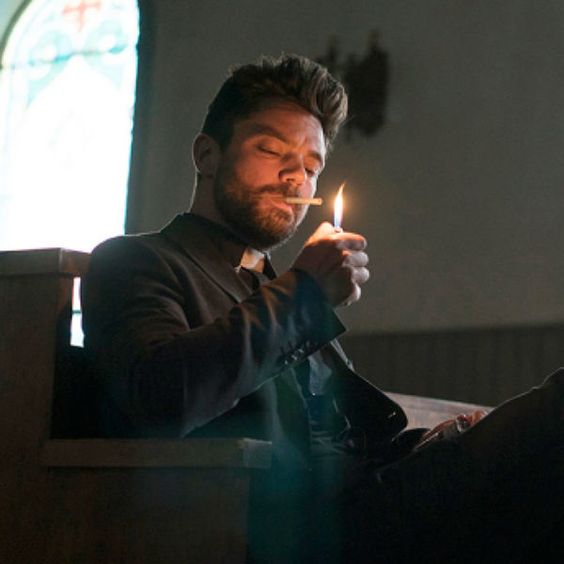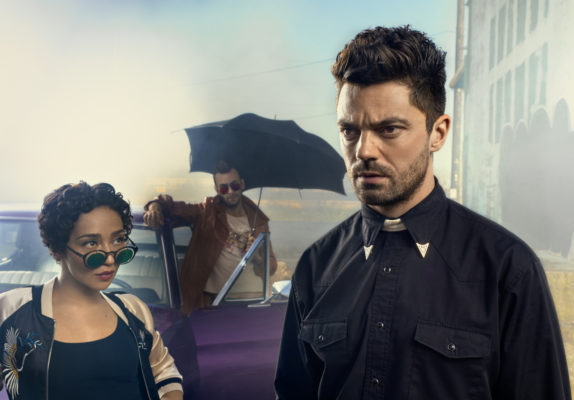
This is going to be a hard sell,” was my first thought after rewatching season 2 of AMC’s Preacher in preparation for this. It’s a graphically violent show to begin with, but the scene where Jesus and a woman are engaged in a rather enthusiastic, acrobatic, even impressive act of coition, there’s just not much you can do with that. When the Catholic League lodges a protest, you know it pushed some buttons. I’m sure the fact that their union resulted in a great-great (squared) grandchild by the name of Humperdoo didn’t help matters. Not to mention the Hitler-turns-over-a-new-leaf-in-Hell story line, or the guy in the Dalmatian outfit…yeah, I’m not going to talk about that one, or the scene where…nope, not touching that either. Let’s just say, this isn’t family friendly tv—well, unless you are the Manson family. Season 1 was much easier to write about. Despite the challenges, if we squeegee away the slick of gore, there are a couple of scenes that struck me as Mockingbird friendly.

At the end of season 1, we learn Jesse Custer’s church revitalization scheme ended with the complete and utter destruction of not only the church, but the entire town of Annville. The opening of season 2 sees Jesse, his partner Tulip, and their friend, the lovable vampire Cassidy, making it out of town in the nick of time and going on a road trip to “find God,” literally. Their first stop is to a friend of Jesse’s father, Rev. Mike, who is a combination of a whisky priest and a scholar with an an unusual pastoring style. Cassidy and Tulip got a taste of this when they discovered a young woman in a cage begging for a cell phone while parking their car out of sight in one of the outbuildings. Mike quickly ushers them out, explaining his flock comes to him when they need help with addictions, like drugs, sex, twitter. He provides them with a safe place while they confront the worst of their inner demons, namely themselves. Neither Rev. Mike nor his parishioners need convincing of Romans 7:15, or of their own low anthropology. The proprietor of a local strip club even went so far as to say that Mike saved her life through his cage ministry. “Covered cage,” as Mike would hasten to add.
In the scene above, where Jesse demands in an echoing voice that Tammy answer his questions about God’s visit to her club, we catch a glimpse of the power known as Genesis. The product of a Hatfield and McCoyish union of an angel and a demon, Genesis, has taken up residence in Jesse. He occasionally uses it to coerce people into doing what he wants, but always for good ends, or at least that is his intention. Jesse’s intentions are not the problem, but it’s the unintended consequences that come with them that are. As an example, in a fit of irritation, using Genesis, he sent his friend Eugene to hell, by simply yelling, “Go to Hell, Eugene!” The problem was, he couldn’t get him back again. Unfortunately, this didn’t stop Jesse from continuing to use his power, even though, as we saw in the scene above, Tulip has her doubts, hating the loss of agency it causes when he does. Now before we get all high and mighty about it, most of us would jump at the chance to make people do what we want. Heck, I’ve been guilty of it myself, after a fashion. I know at times I have engaged in Dune’s Bene Geserit method of discipleship—I’m the Reverend Mother in this scenario:
Innumerable times a whole Christian community has broken down because it had sprung from a wish dream. The serious Christian, set down for the first time in a Christian community, is likely to bring with him a very definite idea of what Christian life together should be and to try to realize it. But God’s grace speedily shatters such dreams. Just as surely as God desires to lead us to a knowledge of genuine Christian fellowship, so surely must we be overwhelmed by a great disillusionment with others, with Christians in general, and, if we are fortunate, with ourselves.
That last sentence, “a great disillusionment…if we are fortunate, with ourselves.” I often think of the Law as the great disillusioner, blowing away the illusions we fog machine ourselves with so that we can see the Gospel as the good news it actually is. We put up a pretty good fight though. We love the stories we tell about ourselves; they provide that illusion, the glamour of the person that is convinced they can wield their ego in a way that is not only heroic, but—ideally—enviable.
Sometimes we don’t even have to spin the tale ourselves, but circumstances do it for us. I was talking to a pastor the other day about how, in my experience, the hardest people to disciple are the most naturally gifted and circumstantially advantaged. They can stand flatfooted on the bottom while most of us mere mortals are desperately trying to tread water, making the water wings of a God-dependent faith and trust a hard sell, although none of us are immune from feeling this way from time to time. Most of my time was spent prepping them for the moment when they would feel this bizarre new experience…need, or as the Reverend Mother would put it, “Pain.” The concept was so foreign to them; it was as if I was trying to sell scuba gear to desert travelers. It is their very success that can make the experience of God’s gracious disillusioning process terrifying when He shoves them into the deep end, well past where their toes can touch—which in real reality, is the safest place they can be.
In recent seasons, Preacher and the CW’s Supernatural have both overlapped with similar story lines of absent deities and dangerously overpowered angel/demon hybrids. As I was writing, it struck me how that mixture maps well onto the whole simultaneously-sinner-and-saint reality we talk so much about. I wonder if the writers of these shows are tapping into a peculiarly Western zeitgeist that is manifesting in the wake of decisions made by people and circumstances we feel we have no control over. We don’t feel safe when our toes don’t touch bottom, and collectively, we are all feeling as if we are thrashing around over the Marianas Trench. Maybe that is why we enjoy characters like Custer or the Winchester brothers, they don’t seem to be burdened with the same anxious feelings, but tackle life with a self-assured confidence.
Towards the end of the last episode, Jesse, who is clearly not feeling out of his depth, figures he can be the new Messiah, as Christ’s scion, named Humperdoo for a reason, is decidedly not up for the task. God seems to be missing, and Jesse, because he wields Genesis—however inconsistently—thinks he can fill the vacuum. Tulip and Cassidy aren’t so sure—they know Jesse, and love him enough to tell him the truth about himself, serving up a “come to Jesus” moment over fries.
Custer is the rabbi we all wish we had, and not only because he’s a supreme being who is also ridiculously good-looking and a really handy with a gun. He’s the preacher who understands that it’s not enough to be told what to do, that you have to feel it in your heart and that to feel it in your heart you need to be surrounded by people who love you and accept you even if you’ve done very regrettable things. He’s the man of God who knows that it’s not enough to follow halakha, or the law; you also have to follow aggadah, the essence of our spiritual thriving, the reason we want to believe. Few of us are blessed with such a shepherd in shul, but all of us ought to be grateful we can find these sparks of the divine in Preacher.

COMMENTS
One response to “J.C. Now Stands for Jesse Custer: Season 2 of AMC’s Preacher”
Leave a Reply














????